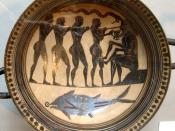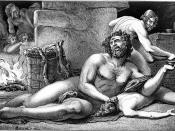Hospitality was an integral part of Greek life and this is extremely apparent throughout Homer's epic The Odyssey. On countless occasions total strangers are welcomed into a host's house and given before their names are even known. The idea of guest friendship is one of the strongest themes in the epic. Three aspects relating to hospitality are displayed: those who welcome without question, such as the Phaecians, those who neglect their duty as hosts, the Cyclops and those who abuse the guest friendship that is extended to them, the Suitors. How these different groups were portrayed and the consequences of their actions provide an insight into the importance placed on hospitality by the Greeks of that period.
Hospitality comes easily when the guest is pleasing to the eye and quite attractive, but Odysseus was quite the opposite when he first arrived in the land of the Phaecians. He was "...a
gruesome sight..." (Bk6, Ln136) and would have repelled anyone, especially someone as highly-born as Nausicaa, who was a princess. The response that people of our age would expect would have been for her to be disgusted and to at least leave him for one of her maids to deal with. But instead she welcomed him and provided for him. She says the he shall not want for "...clothing or anything else that an unfortunate suppliant has the right to expect from those he meets."(Bk6 Ln92-93) The key word in this quote is 'right'. Nausicaa did not believe she was being generous; rather she considered it Odysseus' right to expect these things and more from her. This is how the Greek's regarded hospitality. It was assumed that a stranger, especially one who had experienced strife, would receive help wherever he sought it.
Once Odysseus reached the Phaecian palace he...


